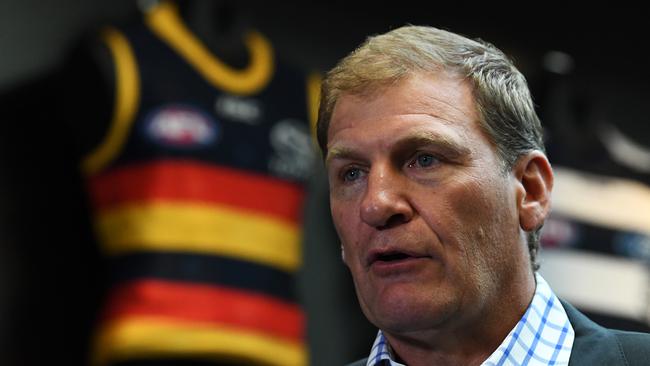AFL match review officer Michael Christian appears to hand out justice on consequences - rather than actions
AFL match review officer Michael Christian has left the question of whether offending players are judged on their actions - or the results of their actions - and Paul Roos is not happy

AFL match review officer Michael Christian is clearly a results-driven man.
Christian sent Fremantle defender Ryan Nyhuis direct to the AFL tribunal for the head-jarring tackle on Port Adelaide forward Robbie Gray at Perth Stadium on Sunday.
By contrast - a point noted by Sydney premiership coach Paul Roos - Christian offered Crows captain and key forward Taylor Walker a one-match ban for his head-stinging bump of Geelong defender Zach Tuohy at Adelaide Oval on Thursday night.
Nyhuis was in the genuine act of tackling an opponent. Walker never competed in the marking contest.
Nyhuis cops a heavy hand from the AFL judiciary by Gray being put on a stretcher and ruled out of the match. Walker gets one match - rather than much more - because Tuohy plays on.
Clearly - and to Roos’ annoyance - Christian is not judging acts but consequences. He is giving Australian football its version of the real-life distinction between attempted murder and murder.
Roos is “staggered” by Christian’s ruling that Walker has accepted - and so has the AFL.
“Quite stunned. This is the most mind-boggling decision Michael Christian has made all year,” adds Roos, who would have handed Walker a three-game ban.
So might have Christian had Tuohy - like Gray - not played out the match.
FOGARTY, GOV IN LINE TO REPLACE TEX
And it is the prime example of why the red-card system troubles Australian football.
Walker was reported on the spot in the first term at Adelaide Oval. Would have the field umpire sent off the Crows captain with a red card?

Nyhuis was not reported as Gray was motionless on the boundary line at Perth Stadium. So how was there to be a red-card call on the Docker?
But Roos finds Walker’s intent - particularly in making Tuohy the object of his actions rather than the ball in a marking contest more concerning than Nyhuis’ “dangerous” tackle on Gray.
“(Walker) runs past the ball, hits the guy in the head and I’m sitting at home thinking, ‘Well if ‘Tex’ gets three (weeks), he’s probably reasonably lucky,” Roos noted.
But Tuohy played on. Gray did not. And justice at AFL House is very much defined by results rather than actions.
This makes the concept of introducing a red card for violent on-field acts more intriguing.
Nyhuis certainly would not have been sent off without a report. But Walker? Would the AFL have to further follow the world game with a VAR (video review) on the sidelines with the three field umpires being the jury to decide if Walker stays on the field or is benched - regardless of Tuohy’s status after a concussion test?
TIME TO LOOK AT SEND-OFF RULE: JENKINS
Australian football is loaded with grey areas - as emphasised each weekend with the holding-the-ball rule.
With themes such as “prior opportunity” and “reasonable time” to dispose of the ball - and “genuine attempt” to move on the ball - the interpretation of one of the game’s most basic rule has become subjective. And this grey area can only deepen with four field umpires next year.
Introducing a red card to the AFL cannot lead to such subjective calls. There is a big difference between a free kick - and a send-off.
